新视野大学英语读写教程3(第三版)Unit1_教案
- 格式:pdf
- 大小:208.68 KB
- 文档页数:3
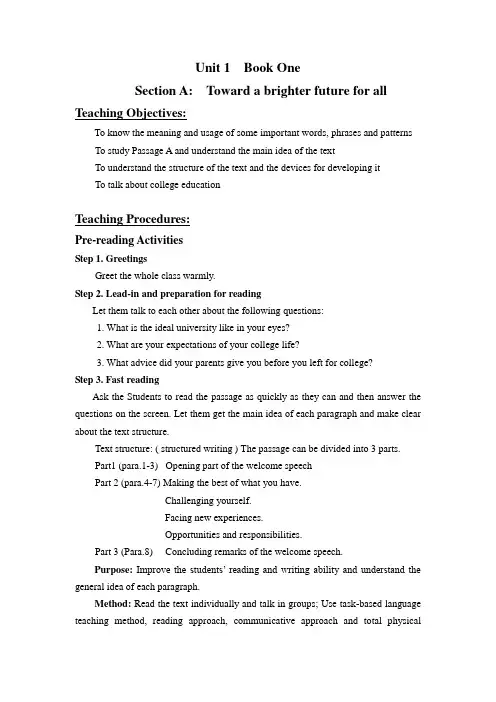
Unit 1 Book OneSection A: Toward a brighter future for all Teaching Objectives:To know the meaning and usage of some important words, phrases and patterns To study Passage A and understand the main idea of the textTo understand the structure of the text and the devices for developing itTo talk about college educationTeaching Procedures:Pre-reading ActivitiesStep 1. GreetingsGreet the whole class warmly.Step 2. Lead-in and preparation for readingLet them talk to each other about the following questions:1. What is the ideal university like in your eyes?2. What are your expectations of your college life?3. What advice did your parents give you before you left for college?Step 3. Fast readingAsk the Students to read the passage as quickly as they can and then answer the questions on the screen. Let them get the main idea of each paragraph and make clear about the text structure.Text structure: ( structured writing ) The passage can be divided into 3 parts.Part1 (para.1-3) Opening part of the welcome speechPart 2 (para.4-7) Making the best of what you have.Challenging yourself.Facing new experiences.Opportunities and responsibilities.Part 3 (Para.8) Concluding remarks of the welcome speech.Purpose: Improve the students’ reading and writing ability and understand the general idea of each paragraph.Method: Read the text individually and talk in groups; Use task-based language teaching method, reading approach, communicative approach and total physicalresponse method.Step 4. Preparation for details of the text on the screenStudents are required to look at the Words and Phrases on the screen and give a brief presentation in class.Words and Phrases:Purpose: Train the Students’ ability of unde rstanding and using foreign language.Method:Talk in groups, Use task-based language teaching method, communicative approach and total physical response method.1. (Para.1)pledge to do sth. 作保证,承诺China and the United states pledge to boost cooperation and exchange to ensure a better future for China-US ties.中美政府承诺将加强合作与交流以确保两国关系的未来更加美好。
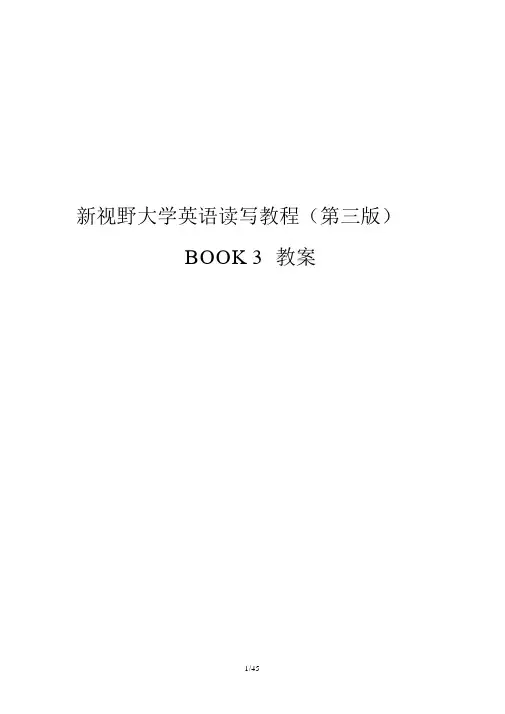
新视野大学英语读写教程(第三版)BOOK 3 教案章节Unit One: The Way to SuccessSection A: New Words and Expressions教案内容Text: Never, ever give up!Exercises: Vocabulary, Sentence Structure,Translation Listening, Speaking & Writing Skills教案目的1.To talk about the secret of success。
2. To further understand the text。
3.To apply the phrases and patterns。
4.To master the essay writing skill。
1. Clearly know the structure of the passage。
2. Master the important language points。
教案要求3.Briefly summarize the passage alone。
4.Correctly use and master the key words in this unit.重点难点1.The structure of the whole passagediscussed and the writing waysmentioned in this passage2.The reading skills mentioned in this unit3.listening practicing related to the contents learned in this unit1.The use of the new words and phrases in this passage2.The writing ways mentioned in this passage3.Some important sentence structures课堂设计Step 1: Lead-in10m Questioning&The Discussing Questioning&First Step 2: Pre-reading Activities10m DiscussingTwoLecturing,PeriodsStep 3: New Words80m Questioning&Giving Examples The Step 1: Background Information10m Questioning& Second DiscussingTwo Step 2: Structure Analysis10m LecturingPeriodsLecturing, Step 3: Language points and Difficult70m Questioning&SentencesGiving ExamplesStep 4: Comprehension of the Text A10m Questioning&DiscussingStep 1: Summarize the passage orally20m Questioning& DiscussingTheStep 2:Exercises (Words in use, WordThird Questioning& building,Banked cloze, Expressions in use,70mTwoTranslation in Section A)DiscussingPeriodsLecturing, Step 3: Revision & Homework10m QuestioningStep 1: Check Homework30m QuestioningTheStep 2:Structured Writing30m Watching &Forth DiscussingTwoStep 3: Listening20m Listening &Periods QuestioningStep 4: Speaking20m Questioning & Discussing教学过程The First Two Periods:Step 1: Lead-in:1.What is success?2.What do you think are the secrets of success?Step 2: Pre-reading Activities:1. Listen to a talk about steps to make your dreams come true. Fill in the blanksbased on what you hear.2. Listen to the talk again and discuss the following questions.Step 3: New WordsThe Second Two Periods:Step 1: Background Information1. Public schools in the UK & US2. Winston ChurchillStep 2: Structure AnalysisPart I (Paras.1-2): By using Winston Churchill’ s story and his speech at Harrow as anintroduction to the topic, the text makes clear its statement: thesecret of success is“ Never give up”.Part II (Paras.3-7): Through the examples of world famous scientists, statesman, andjurist, the text brings forward the statement that only those with astrong will , those who“ keep their eyes on the prize” , and those whoexpend the substantial effort to keep going, will finally succeed.Part III (Paras 8): By reinforcing the statement given in part II, the text draws theconclusion that with hard work, determination, dedication andpreparation, you can transcend any handicap, accomplish any feat,and achieve success.Step 3: Language points and Difficult SentencesPractical Phrases1. deviate from ⋯偏离,背离⋯⋯2. preclude sb. from doing阻止某⋯人做⋯⋯3. triumph over战胜⋯⋯⋯4. in (the) pursuit of追⋯求⋯⋯5. work one’ s 。
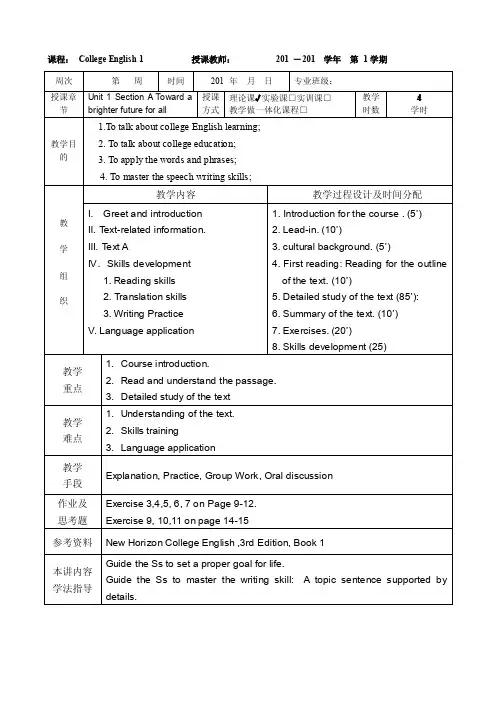
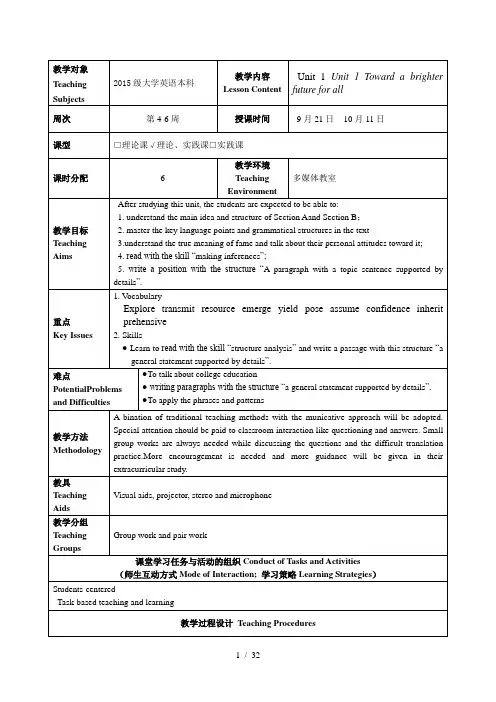
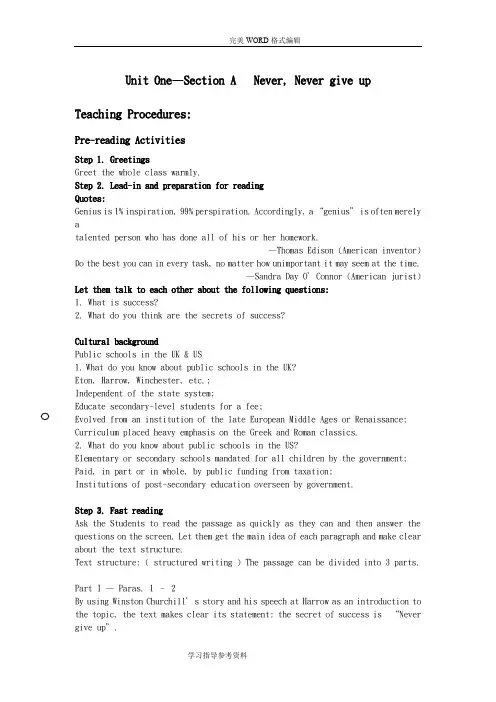
Unit One—Section A Never, Never give up Teaching Procedures:Pre-reading ActivitiesStep 1. GreetingsGreet the whole class warmly.Step 2. Lead-in and preparation for readingQuotes:Genius is 1% inspiration, 99% perspiration. Accordingly, a “genius” is often merely atalented person who has done all of his or her homework.—Thomas Edison (American inventor) Do the best you can in every task, no matter how unimportant it may seem at the time.—Sandra Day O’Connor (American jurist) Let them talk to each other about the following questions:1. What is success?2. What do you think are the secrets of success?Cultural backgroundPublic schools in the UK & US1.What do you know about public schools in the UK?Eton, Harrow, Winchester, etc.;Independent of the state system;Educate secondary-level students for a fee;Evolved from an institution of the late European Middle Ages or Renaissance; Curriculum placed heavy emphasis on the Greek and Roman classics.2. What do you know about public schools in the US?Elementary or secondary schools mandated for all children by the government; Paid, in part or in whole, by public funding from taxation;Institutions of post-secondary education overseen by government.Step 3. Fast readingAsk the Students to read the passage as quickly as they can and then answer the questions on the screen. Let them get the main idea of each paragraph and make clear about the text structure.Text structure: ( structured writing ) The passage can be divided into 3 parts.Part I — Paras. 1 – 2By using Winston Churchill’s story and his speech at Harrow as an introduction to the topic, the text makes clear its statement: the secret of success is “Never give up”.Part II — Paras. 3 – 7Through the examples of world famous scientists, statesman, and jurist, the text brings forward the statement that only those with a strong will, those who “keep their eyes on the prize”, and those who expend the substantial effort to keep going, will finally succeed.Part III — Para. 8By reinforcing the statement given in part II, the text draws the conclusion that with hard work, determination, dedication and preparation, you can transcend any handicap, accomplish any feat, and achieve success.Purpose: Improve the students’ reading and writing ability and understand the general idea of each paragraph.Method: Read the text individually and talk in groups; Use task-based language teaching method, reading approach, communicative approach and total physical response method.Step 4: While-reading ActivitiesStudents are required to look at the Words and Phrases on the screen and give a brief presentation in class.Words and Phrases:Purpose: Train the Stude nts’ ability of understandi ng and using foreign language.Method: Talk in groups, Use task-based language teaching method, communicative approach and total physical response method.Practical phrases1.deviate from …偏离,背离……有人生目标的人是永远不会偏离正确航向的。
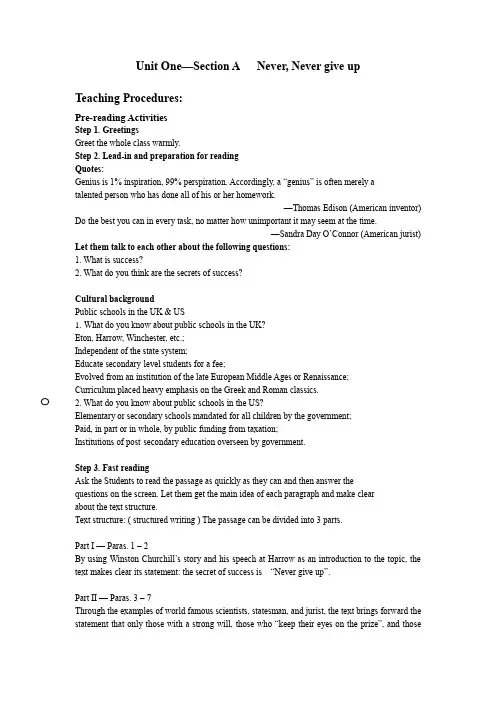
Unit One—Section A Never, Never give upTeaching Procedures:Pre-reading ActivitiesStep 1. GreetingsGreet the whole class warmly.Step 2. Lead-in and preparation for readingQuotes:Genius is 1% inspiration, 99% perspiration. Accordingly, a “genius” is often merely atalented person who has done all of his or her homework.—Thomas Edison (American inventor) Do the best you can in every task, no matter how unimportant it may seem at the time.—Sandra Day O’Connor (American jurist) Let them talk to each other about the following questions:1. What is success?2. What do you think are the secrets of success?Cultural backgroundPublic schools in the UK & US1.What do you know about public schools in the UK?Eton, Harrow, Winchester, etc.;Independent of the state system;Educate secondary-level students for a fee;Evolved from an institution of the late European Middle Ages or Renaissance;Curriculum placed heavy emphasis on the Greek and Roman classics.2. What do you know about public schools in the US?Elementary or secondary schools mandated for all children by the government;Paid, in part or in whole, by public funding from taxation;Institutions of post-secondary education overseen by government.Step 3. Fast readingAsk the Students to read the passage as quickly as they can and then answer thequestions on the screen. Let them get the main idea of each paragraph and make clearabout the text structure.Text structure: ( structured writing ) The passage can be divided into 3 parts.Part I — Paras. 1 – 2By using Winston Churchill’s story and his speech at Harrow as an introduction to the topic, the text makes clear its statement: the secret of success is “Never give up”.Part II — Paras. 3 – 7Through the examples of world famous scientists, statesman, and jurist, the text brings forward the statement that only those with a strong will, those who “keep their eyes on the prize”, and thosewho expend the substantial effort to keep going, will finally succeed.Part III — Para. 8By reinforcing the statement given in part II, the text draws the conclusion that with hard work, determination, dedication and preparation, you can transcend any handicap, accomplish any feat, and achieve success.Structure of the textPurpose : Improve the students’ reading and writing ability and understand the general idea of each paragraph.Method: Read the text individually and talk in groups; Use task-based language teaching method, reading approach, communicative approach and total physical response method.Step 4: While-reading ActivitiesStudents are required to look at the Words and Phrases on the screen and give a brief presentation in class.Words and Phrases:Purpose: Train the Students’ ability of understanding and using foreign language.Method:Talk in groups, Use task-based language teaching method, communicative approach and total physical response method.Practical phrases1.deviate from … 偏离,背离……有人生目标的人是永远不会偏离正确航向的。
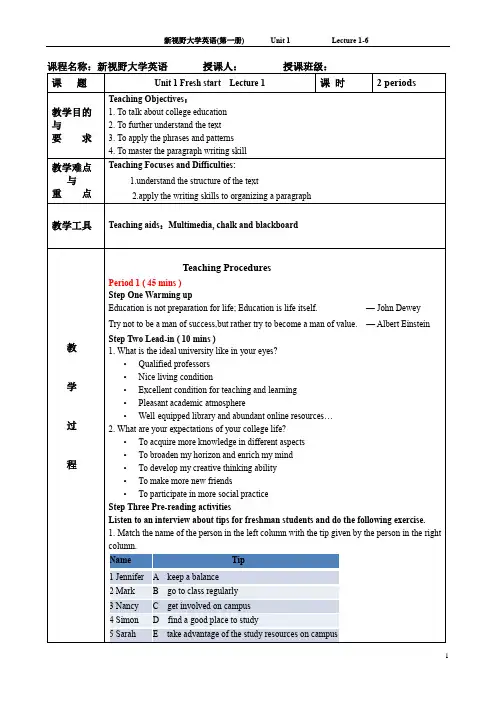
2. What advice did your parents give you before you left for college?1. Match the name of the person in the left column with the tip given by the person in the right column.2. What advice did your parents give you before you left for college?Before I left for college they told me :•To cherish the college experience;•To make use of the opportunities for learning;•To develop more interests;•To read as widely as possible.Listen to a short passage concerning college education and fill in the missing information.This is the VOA Special English Education Report.Universities are generally bigger, offer more __________ and do more research. Modern universities developed from those of the ______________ in Europe. The word “university” came from the Latin “universities.” This described a group of people __________ for a common purpose.Step Four Cultural backgroundAmerican university education1. In the United States, what choices do the students have after high school?2. What are the major criteria for university admission?3.What kind of extracurricular activities can students participate in? What can they?1.In the United States, what choices do the students have after high school?•go to college;•go straight to the workforce;•attend a two-year community college before applying to a university.2. What are the major criteria for university admission?• A student’s high school course of study;•High school Grade Point Average (GPA);•Participation in extracurricular activities;•SAT or ACT exam scores, a written essay;• A personal interview with a representative from the admissions office.3.What kind of extracurricular activities can students participate in? What can they learn?The activities include:•Scholastic clubs, athletic teams, student government, and philanthropic (慈善) clubs.2.Discourse AnalysisTeaching ProceduresPeriod 1 ( 45 mins )Step One Text study( 45 mins )The text is __________ made by __________________ to _________________. (Para.1) According to the speaker, of what did the parents always remind their children before they came to college? (Para.3)Work hard and attain their best.What’s the speaker’s purpose in mentioning the parents’ reminders? (Para.3)Help the students realize that the future is built on a strong foundation of the past.Work hard and attain their best.Step Two Main idea & structurePart I (Paras. 1- 3)The president congratulates students on their achievement and reminds students of the fact that their current success was due to their own and their parents’efforts,, and that their future is built on a solid foundation of the past.How will the next four years be different from any other? Or what great resources will you enjoy ? (Para.4)Students are called upon to cherish the opportunities, and to keep in mind their responsibilities. (Para. 8)Toward a Brighter Future for AllGood afternoon! As president of the university, I am proud to ___________ you to this university. Your current achievement is the __________ of years of hard work. Here, you may encounter things you do not expect. But remember: Your future success is built on a solid ____________ of the past.For you, the next four years will be a time unlike any other. You are provided with great ___________ and the freedom to explore new subjects and ________ new passions. What you need to do is to _________________ this unique experience, and to use your energy and enthusiasm to ______________ of this opportunity. You may also feel _____________ by the wealth of courses available. My advice is:____________ yourself! You should _______ new subjects, cultivate new interests, and pursue new passions. Besides, there also may be many _____________ experiences as well as pleasant ones here at the university. But the latter will ___________ the former. All of them will become valuable lessons to _______ your lives. So, get ready to meet these new experiences optimistically. At last, with ______________ opportunities. there also come _________________. You should bear the expectations and responsibilities as you __________ and pass on the spirit of hard work, and _________ and transmit knowledge.We take ___________ in the many opportunities you will find here and in the responsibilities you will carry as __________ of your communities, your country, and the world. Welcome!Step Three Summary and Assignment ( 3 mins )AssignmentDo Exercises 1-2 at Page 9.Focus on some useful expressions and active vocabulary.Copy new words.Reflection after Class2. Writing: Combination __ Using Connectives ( 关联词)Teaching ProceduresPeriod 1 ( 45 mins )Step One Paragraph WritingIf he did, I am sorry I never told him(我是多么对不起他,我是个多么不孝敬的儿子,我是多么后悔)____________________________________________.I think of them (每当我因为一些琐事而怨天尤人的时候,每当我嫉妒别人运气比我好的时候,每当我没有一颗“好心”的时候) ____________________________________ ____________________________________ _______________________________.Paragraph writingExample:For you, these next four years will be a time unlike any other. (Topic sentence) Here you are surrounded by great resources: interesting students from all over the country, a learned and caring faculty, a comprehensive library, great sports facilities, and student organizations covering every possible interest from the arts to science, to community service and so on. (Detail 1: What is available to you on campus)Example:You will have the freedom to explore and learn about new subjects. You will learn to get by on very little sleep, meet fascinating people, and pursue new passions. (Detail 2: What you can do) I want to encourage you to make the most of this unique experience, and to use your energy and enthusiasm to reap the benefits of this opportunity. (Concluding sentence) Writing practiceDirections: Have a look at the outline below and the sample paragraph, which starts with a topic supported by details.Topic sentence: How to choose a suitable university.Sample paragraph:When choosing a university, you must consider some key factors. (Topic sentence) The most important factor is whether the university can prepare you well for your future. It should provide up-to-date courses and have qualified professors. (Detail 1) Another factor is affordability. You need to be able to afford the tuition fees and living expenses. Some schools offer scholarships to outstanding students or to those who cannot afford the tuition fees. (Detail 2)Sample paragraph:Finally, a good location is also important. An ideal school should be located in a quiet place and have convenient public transport. (Detail 3) You should consider these factors carefully in order to find the most suitable university. (Concluding sentence)Directions: Write a paragraph on one of the following topics. One of the topics has an outline you can follow.Step Two Summary and Assignment ( 3 mins ) Assignment:Focus on some useful expressions and active vocabulary.Do Exercises: Structure: at Page 13-14. Translation: at Page 16. Reflection after ClassStep Five Summary and Assignment ( 3 mins ) Assignment:Listening Exercises: Part D in Unit OneReflection after Class。
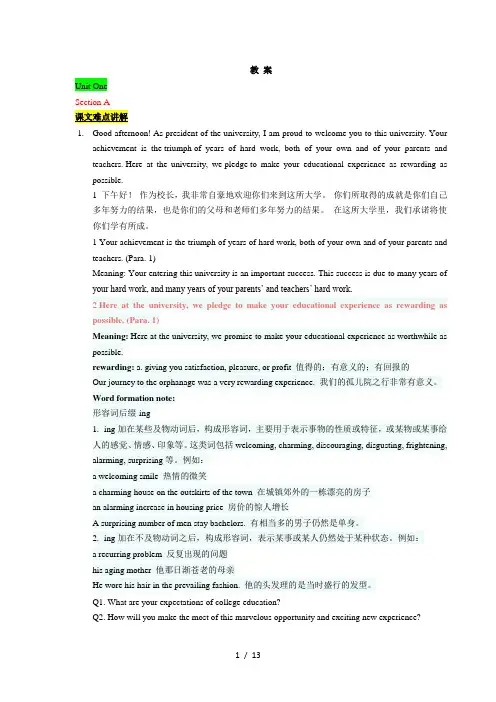
教案Unit OneSection A1.Good afternoon! As president of the university, I am proud to welcome you to this university. Yourachievement is the triumph of years of hard work, both of your own and of your parents and teachers. Here at the university, we pledge to make your educational experience as rewarding as possible.1 下午好!作为校长,我非常自豪地欢迎你们来到这所大学。
你们所取得的成就是你们自己多年努力的结果,也是你们的父母和老师们多年努力的结果。
在这所大学里,我们承诺将使你们学有所成。
1 Your achievement is the triumph of years of hard work, both of your own and of your parents andteachers. (Para. 1)Meaning: Your entering this university is an important success. This success is due to many years of your hard work, and many years of your parents’ and teachers’ hard work.2 Here at the university, we pledge to make your educational experience as rewarding aspossible. (Para. 1)Meaning: Here at the university, we promise to make your educational experience as worthwhile as possible.rewarding: a. giving you satisfaction, pleasure, or profit 值得的;有意义的;有回报的Our journey to the orphanage was a very rewarding experience. 我们的孤儿院之行非常有意义。
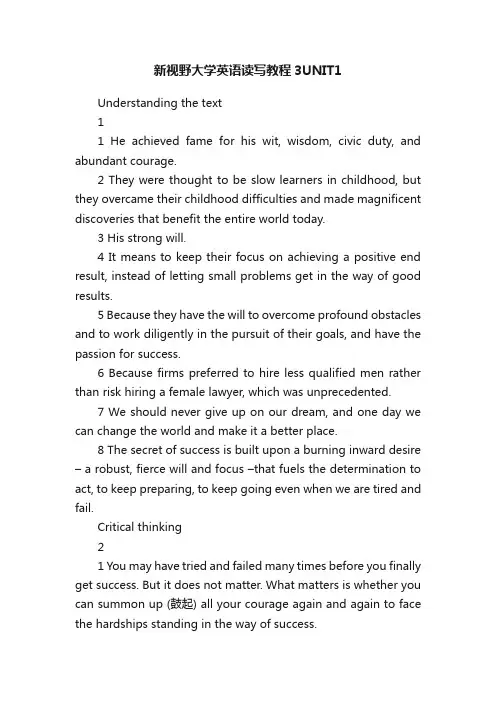
新视野大学英语读写教程3UNIT1Understanding the text11 He achieved fame for his wit, wisdom, civic duty, and abundant courage.2 They were thought to be slow learners in childhood, but they overcame their childhood difficulties and made magnificent discoveries that benefit the entire world today.3 His strong will.4 It means to keep their focus on achieving a positive end result, instead of letting small problems get in the way of good results.5 Because they have the will to overcome profound obstacles and to work diligently in the pursuit of their goals, and have the passion for success.6 Because firms preferred to hire less qualified men rather than risk hiring a female lawyer, which was unprecedented.7 We should never give up on our dream, and one day we can change the world and make it a better place.8 The secret of success is built upon a burning inward desire – a robust, fierce will and focus –that fuels the determination to act, to keep preparing, to keep going even when we are tired and fail.Critical thinking21 You may have tried and failed many times before you finally get success. But it does not matter. What matters is whether you can summon up (鼓起) all your courage again and again to face the hardships standing in the way of success.2 Luck, talent, good relationships with your colleagues, etc.3 ? When I have realized that I am pursuing something that is hard to achieve, I would try to stick to the goal. But I will begin to think of what I can do to improve the situation. When it still doesn’t work, I would try t o analyze what the problem is and then make some changes and probably reset my goal.Yes, sometimes we are pursuing the wrong goal which can never be achieved, only to find ourselves in deep frustration and profound fatigue. In this situation, I may give up the wrong goal and set up another goal that is achievable.4 ?Following the guidance of senior people.Getting sound advice from our parents.Setting a correct goal.Achieving success step by step.Developing good interpersonal relationships.Language focusWords in use31 whereby2 pursuit3 inhibit4 maintain5 patriotic6 transcended7 endeavors8 dedication9 prestige 10 nominateWord building4Words learned New words formedinhabitant inhabit participate participant attend attendantpollute pollutant descend descendant contest contestant tolerate tolerantresult resultant-fulneglect neglectful resource resourceful boast boastfulrespect respectful51 resultant2 tolerant3 pollutants4 inhabited5 contestants6 descendants7 attendants8 respectful9 participants 10 neglectful 11 resourceful 12 boastful Banked cloze61 F2 G3 H5 E6 A7 N8 I9 K 10 MExpressions in use71 removed from2 failed in3 in the pursuit of4 deviated from5 precludes; from6 triumph over7 work their way into8 written offStructure analysis and writingStructured writing8They say there’s no place like home. In my case, there isn’t much that is good about my apartment. My apartment has given me nothing but headaches. From the day I signed the lease, I’ve had to deal with an uncooperative landlord, an incompetent janitor, and inconsiderate neighbors.First of all, my landlord has been uncooperative since the first day I moved to the apartment. He didn’t let me bring my fish into the apartment. He said that pets are not allowed even though it’s just a fish. Because of that, I must leave my fish at my parents’ house. He also forbids me from using water from 9 a.m. until 3 p.m. Because of that, I must wake up at 7 a.m. everyday to take a bath. Of course I complained about this to him, but he said that is the apartment’s rule. Before I leased the apartment, he didn’t say that there are such rules in the apartment.I’ve had problems not only with my landlord but also with an incompete nt janitor. The janitor is a retired policeman. He tried to fix the pipe in the apartment, but he flooded the apartment instead.He also broke my air conditioner when he tried to fix it. Because of that, my apartment becomes as hot as a desert every afternoon. Not only that, but he also broke my antique vase that cost me $100. Even worse, when he plugged his USB flash drive into my laptop to copy my songs, the viruses from his flash drive spread into my laptop. I had to reformat my laptop, and because of that, all of my important documents are gone.Perhaps the worst trouble of all has been with the inconsiderate neighbors who live in the apartment above me. My neighbors are two university students. They have lived upstairs for about one year. They like to party, so I can’t sleep. This happened not only once, but every Saturday night. I tried to speak to them, but they suggested putting in ear plugs when I’m about to sleep. On top of it all,they always turn up the volume of their music to the maximum.Sometimes, my apartment seems like a small, friendly oasis surrounded by hostile enemies. I never know what other trouble is going to come from next: the landlord, the janitor, or the neighbors. Home may be where the heart is, but my sanity is thinking about moving out.Translation9世界公民是指一个人承认自己是新兴的全球社区的一分子,而且其行动对全球社区的价值打造和实践活动有所贡献。
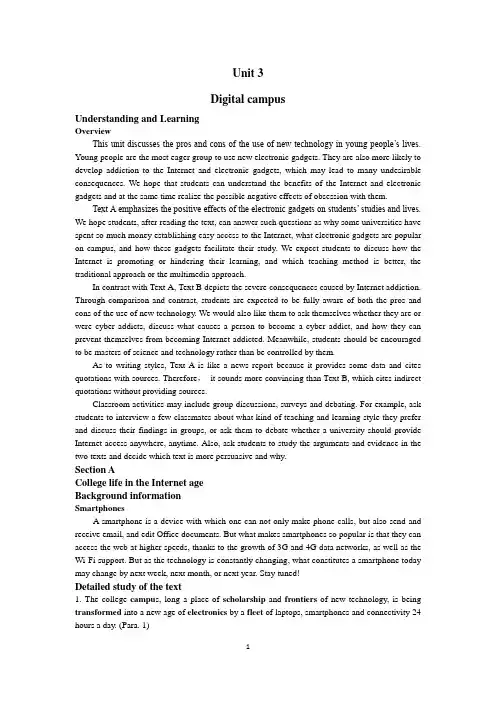
Unit 3Digital campusUnderstanding and LearningOverviewThis unit discusses the pros and cons of the use of new technology in young people’s lives. Young people are the most eager group to use new electronic gadgets. They are also more likely to develop addiction to the Internet and electronic gadgets, which may lead to many undesirable consequences. We hope that students can understand the benefits of the Internet and electronic gadgets and at the same time realize the possible negative effects of obsession with them.Text A emphasizes the positive effects of the electronic gadgets on students’ studies and lives. We hope students, after reading the text, can answer such questions as why some universities have spent so much money establishing easy access to the Internet, what electronic gadgets are popular on campus, and how these gadgets facilitate their study. We expect students to discuss how the Internet is promoting or hindering their learning, and which teaching method is better, the traditional approach or the multimedia approach.In contrast with Text A, Text B depicts the severe consequences caused by Internet addiction. Through comparison and contrast, students are expected to be fully aware of both the pros and cons of the use of new technology. We would also like them to ask themselves whether they are or were cyber addicts, discuss what causes a person to become a cyber addict, and how they can prevent themselves from becoming Internet-addicted. Meanwhile, students should be encouraged to be masters of science and technology rather than be controlled by them.As to writing styles, Text A is like a news report because it provides some data and cites quotations with sources. Therefore,it sounds more convincing than Text B, which cites indirect quotations without providing sources.Classroom activities may include group discussions, surveys and debating. For example, ask students to interview a few classmates about what kind of teaching and learning style they prefer and discuss their findings in groups, or ask them to debate whether a university should provide Internet access anywhere, anytime. Also, ask students to study the arguments and evidence in the two texts and decide which text is more persuasive and why.Section ACollege life in the Internet ageBackground informationSmartphonesA smartphone is a device with which one can not only make phone calls, but also send and receive email, and edit Office documents. But what makes smartphones so popular is that they can access the web at higher speeds, thanks to the growth of 3G and 4G data networks, as well as the Wi-Fi support. But as the technology is constantly changing, what constitutes a smartphone today may change by next week, next month, or next year. Stay tuned!Detailed study of the text1. The college campu s, long a place of scholarship and frontiers of new technology, is being transformed into a new age of electronics by a fleet of laptops, smartphones and connectivity 24 hours a day. (Para. 1)Meaning: For a long time, the college campus has been a place to provide education and produce most advanced new technology. But it is now being completely changed into an electronic-age hot spot by the wide use of laptops, smartphones, and access to the Internet 24 hours a day.★campus: n. [C, U] the land and buildings of a university or college (大学或学院的) 校园All freshman students live on campus. When they are in their second year at college, they may live off campus. 所有大学一年级的学生都住在校园里。
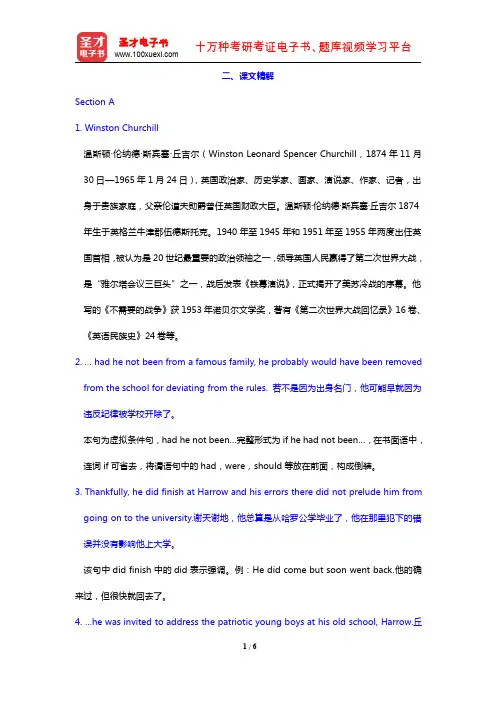
二、课文精解Section A1.Winston Churchill温斯顿·伦纳德·斯宾塞·丘吉尔(Winston Leonard Spencer Churchill,1874年11月30日—1965年1月24日),英国政治家、历史学家、画家、演说家、作家、记者,出身于贵族家庭,父亲伦道夫勋爵曾任英国财政大臣。
温斯顿·伦纳德·斯宾塞·丘吉尔1874年生于英格兰牛津郡伍德斯托克。
1940年至1945年和1951年至1955年两度出任英国首相,被认为是20世纪最重要的政治领袖之一,领导英国人民赢得了第二次世界大战,是“雅尔塔会议三巨头”之一,战后发表《铁幕演说》,正式揭开了美苏冷战的序幕。
他写的《不需要的战争》获1953年诺贝尔文学奖,著有《第二次世界大战回忆录》16卷、《英语民族史》24卷等。
2.…had he not been from a famous family,he probably would have been removed from the school for deviating from the rules.若不是因为出身名门,他可能早就因为违反纪律被学校开除了。
本句为虚拟条件句,had he not been…完整形式为if he had not been…,在书面语中,连词if可省去,将谓语句中的had,were,should等放在前面,构成倒装。
3.Thankfully,he did finish at Harrow and his errors there did not prelude him from going on to the university.谢天谢地,他总算是从哈罗公学毕业了,他在那里犯下的错误并没有影响他上大学。
该句中did finish中的did表示强调。
例:He did come but soon went back.他的确来过,但很快就回去了。
工业学院教案课程:大学英语(3)学期:20 —20 学年第一学期教师:工业学院教案Unit 1说写课(第1次课)The first 50 minutes:Step1: Term plan and pre-reading activities. (15 minutes)1.Introduce the term plan of learning English and some changes in teachingincluding how to grade English in this term.2.Talk about the topic “The way to success” and ask students how to define “success”.Do the pre-reading activities on page 2 (listening).Step 2: Text A reading comprehension.1.Ask the students to read Text A within 15 minutes and raise questions about textunderstanding.2.Discuss and find answers to questions on page 9: understanding the text andcritical thinking (for critical thinking questions, the teacher had better ask the students to choose only one or two to discuss). While the students are discussing, the teacher may walk around and offer some help. Then, ask one or two students to report their discussion results. (20 minutes)The second 50 minutes:Step3: Key words, phrases and expressions. (15 minutes)Step 4: Functional patterns. (15 minutes)Use the following patterns to make sentences.1. He was not a good student, and had he not been from a famous family, he probably would have been removed from the school…... (L2, Para.1)“had he not been …”为倒装的虚拟条件句,相当于“if he had not been……”。
Unit 1 Fresh StartSection AIn fact all the pieces of advice mentioned in the interview are very useful. But if I have to choose one as the most useful, I'd choose "keep a balance". When we were in high school, we spent almost all our time studying. There lacked a balance between social life and academic life in high school. It's important to keep a balance between life and work because it will give us a sound mind in a sound body. Now we have much more free time, so we can join student organizations or go to different activities.2.What advice did your parents give you before you left for college?Before I left for college my parents did have a talk with me. They told me how important college experience would be in my life. They told me about the opportunities that college education would open up to me. They told me to try to develop more interests and join some student clubs. The most impressive advice they gave me was that I should not only read books about my major; instead, they advised me to read as widely as possible. All these are very valuable pieces of advice.Reading comprehension1.According to the president, what did the parents remind their children to do before theyleft for college?The parents reminded their children to work hard and achieve the best they could.2.What does the president call on the students to do with the greatest resources oncampus?The president calls on the students to make the most of the great resources on campus: to explore new subjects, to meet fascinating people, and to pursue new passions.3.What does the president mean when he says "sample them widely" (Para. 5)?By saying "sample them widely", the president means students should try many different courses and try something new to see what it is like.4.What could be the consequences if you don't challenge yourself?If we don't challenge ourselves, we will not become broadly educated people, and we may not find the passion that will help us shape our future.5.What can you learn from the example of Vera Wang?We can learn from the example of Vera Wang that we should challenge ourselves, and by challenging ourselves, we are more likely to find an interest we don't know we have, and this interest may help us build a prosperous future.6.How should you deal with new and unpleasant experiences in college?We should not worry, and we should learn to face this new part of our life with enthusiasm. College experiences, pleasant or unpleasant, will provide us with valuable lessons and will enrich our life.7.How do you understand "Now it is your turn" (Para. 7)?The expression "Now it is your turn" means that now it is time for you to acquire knowledge and to pass it on.8.How does the president's speech impress you?The president's welcoming speech is really impressive. He mentions many important things about college life, the resources available on campus, as well as the opportunities we have and the responsibilities that we should take. The speech is very inspiring.1. What role do you think a university education will play in your life?A university education will play a very important role in my life, and it will benefit me in a number of ways. In the university I can acquire specialized knowledge about my major, and develop my critical thinking and research skills. I will have the opportunities to meet and share ideas with people of different minds. I can gain a broader view of the world by meeting people from diverse backgrounds and cultures. And I will start my life journey of self-discovery, self-improvement, and self-fulfillment.2.Do you think a university education can change a person's life? In what way and why? Yes, absolutely. With a university education, a person will have more freedom and therefore more choices. This education experience provides unlimited potential. Moreover, a university education provides the means for one to succeed. Not only will a person obtain knowledge and skills essential for his career development, but he will also develop an independent mind and be able to make right decisions on his own.3.How do you think about those successful people such as Bill Gates who dropped out ofuniversity?I admire those who dropped out of university and yet had made fame for themselves by achieving big goals. Some people use those successful college dropouts as counterexamples to show their belief that a person can succeed even without a university education. Chances are that most people do not have the same mind, talent, determination, or opportunities as Bill Gates, Steve Jobs, and Mark Zuckerberg did; therefore, they might not be able to achieve success without having a university education. In fact, a university education will equip them with the necessary knowledge and skills which will help them to succeed.4.How do you understand the statement "If you think education is expensive, tryignorance"?Nowadays education is getting more and more expensive, especially college education. And there are people who choose to give up education because of the high cost. But without education, one would not be able to acquire knowledge that an education will offer. In other words, they would be "ignorant". The result would be that "ignorant" people will suffer even more or pay even more for being so. It is true that education is expensive, but if you try "ignorance", the cost would be even higher.5.What are you going to do at university in order to sample widely and challenge yourself? To sample widely and challenge myself, I am going to venture out of my comfort zone and do what I have not had the courage to do. For instance, I will make friends with people from diversebackgrounds and cultures. I will take a swimming class and learn how to swim. I will attend lectures, join student clubs, and try all kinds of food. Most of all, I will do whatever it takes to make the most of the four years and try to become a well-rounded graduate.Words in use1. Given the chance to show his ability, he regained (confidence) and began to succeed in school.2. It is so difficult to (explore) the bottom of the ocean because some parts are very deep.3. It was about 30 seconds before Alex (emerged) from the water; we were quite scared.4. We often (assume) that when other people do the same things as we do, they do them for the same reasons; but this assumption is not always reasonable.5. There is widespread concern that the rising unemployment may(pose)a threat to social stability.6. After a(n) (comprehensive) physical exam, my doctor said I was in good condition except that my blood pressure was a little high.7. It is well known that China is a country with rich natural (resources) and a very big population.8. Some people believe that the earth can (yield) enough food to support at least twice its present population.9. Sam (inherited) the gift of imagination from his family, but he lacked the driving power to take action.10. A bee that has found honey is able to (transmit) to other bees the information they need in order to collect the honey.Word building: Practiceun-cover ➝ 1)(uncover)easy ➝ 2)(uneasy)load ➝ 3)(unload)-antapply ➝ 4)(applicant)resist ➝ 5)(resistant)account ➝ 6)(accountant)assistant ➝ 7)(assist)-ifysimple ➝ 8)(simplify)note ➝ 9)(notify)quality ➝ 10)(qualify)class ➝ 11)(classify)1. Despite being (classified)as a meat-eater, the panda has a diet that is overwhelmingly vegetarian.2. They have developed computerized systems which will greatly (assist) all library users so that they will not need the help of others.3. Changes have been made to the construction requirements in this city in order to make the buildings and highways more (resistant) to earthquakes.4. After a two-month inquiry, the police have (uncovered)the three men's intention to rob a bank and have arrested them.5. Consumers say they are (uneasy) about using their credit cards over the Internet because they are afraid of Internet fraud (欺诈) and identity theft.6. A college degree and some working experience should (qualify) you for the job advertised in the newspaper.7. The British ship arrived at the port this morning and is (unloading) its contents in the harbor now.8. As a human resources manager, I see many job (applicants)who are technically skilled, but have bad attitudes.9. The teacher (simplified) his instructions so that the small children could understand him better.10. My major was literature. However, now I'm working in a firm as a(n) (accountant), dealing with numbers every day.11. The committee's decision will be (notified) to all employees next week.Banked clozeUniversity students come from different parts of the country with various purposes. However, a closer look at their reasons for studying at the university will enable us to 1)(classify)them roughly into three groups: those who have a(n) 2)(passion)for learning, those who wish to 3)(attain) a bright future, and those who learn with no definite purpose.Firstly, there are many students who learn simply because they 4)(pursue) their goal of learning. Some read a wealth of British and American novels because they are keenly interested in literature. Others sit in front of the computer screen, working on a new program, 5)(virtually) day and night, because they find some computer programs 6)(fascinating), and they dream of becoming a "Bill Gates" one day.Secondly, there are students who work hard mainly for a better and more 7)(prosperous) future. It seems that the majority of students fall into this group. After admission to the university, they read books after books to 8)(acquire) knowledge from all of the resources which are 9)(available) to them, and finally, to succeed in the future job market.Thirdly, there are still some students who learn without a clear goal. They take courses, finish homework, enjoy life on campus, but don't want to 10)(sample)anything new or challenging. They have no idea what they will be doing after college. And they may end up with nothing in their lives.Expressions in use1. My family 1)(got by) on my father's unemployment benefit after he lost his job.2. Many subway riders read books or listen to music in order to 2)(make the most of) their time on the way to work.3. In order to make sure he would be able to attend the meeting, I called him up two weeks 3)(in advance).4. Experts say our company is amazing in that sales have been increasing steadily 4)(over time).5. In order to 5)(reap the benefits of) the physical exercise, you have to exercise regularly, and for at least half an hour each time.6. They all tried to talk 6)(all at once), but I couldn't hear anything they said.7. Yellow flowers in the field always 7)(remind) me 8)(of) my childhood in the countryside.8. We have been practicing for so long and so hard that our team should 9)(stand a chance of) winning the game.9. Research on genes will 10)(open the door to) exciting new medical treatments.10. Every one of you has made a contribution and I 11)(take pleasure in)acknowledging what each of you has done to make this academic convention such a success.Structure analysis: PracticeA B B CStructured writing: PracticeThere are some things you can do to succeed in college. First, pursue passions. Your passions will broaden your mind and make your life interesting. Second, never let go of any opportunities that come your way. College is full of unique opportunities, which will enable you to sample new things and meet wonderful people. Lastly, take responsibilities. In college you must learn to be responsible for your own decisions and actions. With the passions, the opportunities, and the ability to take responsibilities, you will become successful not only in college, but also in your future career.Translation苏格拉底是古希腊哲学家,被誉为现代西方哲学的奠基人。
新视野⼤学英语读写教程第三版电⼦教案Book1Unit1Unit 1Fresh StartUnderstanding and LearningOverviewThe first unit of the first book of our series meets students who have just entered college or university and are beginning a new phase in their lives. We hope that students will be able to talk about their expectations of their college experience, and they will be aware of the expectations their parents and their educators have of them.Text A is a university president’s welcome speech, in which the president gives valuable guidance to and expresses expectations of freshman students.Text B is a letter written by a father to his child who is about to start college, in which the father expresses his expectations of the child. We hope that the two texts will stimulate students to share their own expectations regarding their college experience; and we also hope the two texts will help students look from a new perspective at the expectations their educators and their parents have of them Text A shows characteristics of a speech. Pronouns I, we and you are more frequently used than in other kinds of writing because the speaker is addressing the audience directly, hoping to motivate the audience and to gain their support and understanding. In a speech, the speaker can employ a variety of figures of speech to make his speech vivid and powerful, such as simile, metaphor, contrast, parallelism(排⽐), and repetition. A very common figure of speech is parallelism. In parallelism, coordinate ideas are arranged in words, phrases, sentences, and paragraphs to emphasize and point out relations. In Text A, for example, the president uses many sentences of parallel structure. This makes his speech powerful, persuasive, and thought-provoking. It can even produce humorous effect as in the example: “You may have cried tears of joy to be finally finished with high school, and your parents may have cried tears of joy to be finally with doing your laundry!”The most obvious feature of Text B is that it contains many imperative sentences, and these sentences tend to be brief. An imperative sentence advises, instructs, requests, or commands. It begins with a verb; the implied subject is you.In Text B, a father makes use of imperative sentences to give advice and instructions to his child who has just left home for college. For example: “Don’t be bound by what other people think.”“Pick friends who are genuine and sincere.”“Become the great thinker you were born to be.”In class the teacher can make the students compare the writing styles of Text A and Text B. Class activities may include pair work, group discussions, and mini-surveys about students’high school experience, their families and friends, and their expectations of college life. Section AToward a brighter future for allBackground information1. American higher educationIn the United States, students can choose to go to college after high school. (They can also choose to go straight to the workforce after high school.) They have the option of attending a two-year community college before applying to a four-year university. Admission to communitycollege is easier, tuition is lower, and class sizes are often smaller than at a university. Community college students can earn an associate agree and transfer up to two years of course credits to a university.College and university students need to pay tuition, but many earn scholarships or receive loans. Although admissions policies vary from one university to another, most determine admission based on several criteria, including a student’s high school course of study, high school Grade Point Average (GPA), participation in extracurricular activities, SAT(Scholastic Assessment Test) or ACT (American College Testing) exam scores, a written essay, and possibly a personal interview with a representative from the admissions office.Most students in the United States take the SAT Reasoning Test or the ACT during their final year of high school. Each university sets a minimum SAT or ACT score that a student must achieve in order to gain admission. These are standardized quantitative examinations. The SAT tests critical reading, mathematics, and writing skills, The ACT tests English, mathematics, reading, science reasoning, and includes an optional writing test.Extracurricular activities may include scholastic clubs, athletic teams, student government, and philanthropic clubs. V oluntary participation in these kinds of activities is an indication that a student has learned valuable life lessons, such as teamwork, leadership, or civic responsibility.University students pursuing a bachelor’s degree are called “undergraduates”; students pursuing a master’s or doctoral degree are called “graduate students”. Most universities give under graduate students a liberal education, which means students are required to take courses across several disciplines before they specialize in a major field of study. Graduate and professional programs, such asmedicine or law, are specialized. All degree programs require students to complete a minimum number of credit hours before graduating.Selection for admission to a graduate program is based on several criteria. These include completion of a bachelor’s degree, the student’s undergraduate coursework and GPA. Students are also expected to write an essay as part of their application or to submit a writing sample. Most master’s programs require students to have a minimum score on the Graduate Record Examination (GRE), which tests verbal reasoning, quantitative reasoning, critical thinking, and analytical writing skills.Students continue to take course at the graduate level. A final thesis is required for most master’s programs. Doctoral students take course until they have earned enough credit hours to attempt their qualifying examinations. These are usually taken over several days and often include a written and oral component. After doctoral students pass their qualifying exams, they are advanced to candidacy and can begin writing their dissertation. Before the degree is given, the completed dissertation must be orally defended before the candidate’s faculty committee.2. Vera WangVera Wang is a Chinese-American fashion designer. She was born and raised in New York City. While trained as a figure skater in high school, she eventually earned a degree in art history from Sarah Lawrence College in 1971. But a career in fashion was her dream. She worked as a senior fashion editor for Vogue magazine for 15 years. In 1985, she left vogue and joined Ralph Lauren as a design director for two years. In 1990, she opened her own design salon in New York, and featured her trademark bridal gowns. Wang has made wedding gowns for many celebrities and public figures, such as Jennifer Lopez (詹尼佛·洛佩兹), Sharon Stone (莎朗·斯通) and Chelsea Clinton (切尔西·克林顿).Detailed study of the text1. Your achievement is the triumph of years of hard work, both of your own and of your parents and teachers. (Para. 1)Meaning: Your entering this university is an important success. This success is due to many years of your hard work, and many years of your parents’ and teachers’ hard work.★triumph: n. [C] an important victory or success after a difficult struggle (尤指苦战后获得的)胜利,成功,成就Winning the championship was a great personal triumph for this young tennis player.赢得冠军对这个年轻的⽹球运动员来说是很⼤的个⼈成就。